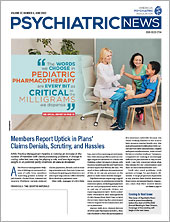Patients being treated for depression by their primary care doctor may benefit from participating in a 12-week computer program that teaches cognitive-behavioral therapy (CBT) skills, suggests a study in JAMA Network Open.
This study was notable in that it included many participants who have typically not been included in previous computerized CBT trials, such as those with low incomes, limited education, and no internet access.
“These findings hopefully reinforce that CBT is an adaptable therapy that can benefit anyone,” said lead study author Jesse Wright, M.D., Ph.D., a professor of psychiatry and director of the Depression Center at the University of Louisville.
Wright and colleagues recruited 175 adults with depression from university-affiliated clinics across Louisville (as well as one clinic in rural Glasgow, Ky.). The participants were predominantly female (84.5%) and included members of racial and ethnic minorities (39.6%), adults with less than a college education (74.6%), adults with an annual income under $30,000 (61.5%), and adults with no internet access (29.8%). To accommodate the last group, the researchers provided low-cost loaner laptops and a basic internet plan to participants who requested them.
The participants were randomly assigned to receive 12 weeks of their usual depression care or 12 weeks of usual care plus a computer-assisted CBT program known as Good Days Ahead. The program consists of nine multimedia lessons that cover the core concepts of CBT, such as identifying negative thoughts and developing skills to redirect negative thoughts into positive ones; the computer lessons are supplemented by up to 12 telephone support sessions with a master’s-level mental health clinician. Usual care could include psychotherapy and/or antidepressants, though many participants were not receiving either at the start of the study.
After 12 weeks, the adults who received the computer-assisted CBT had significantly greater improvements in their depressive symptoms (measured with the 9-item Patient Health Questionnaire, or PHQ-9) compared with the usual care group; average PHQ-9 scores were 8.6 for the CBT group and 11.1 for the usual care group. In addition, 27.3% of participants who received computer-assisted CBT experienced remission of their depression (defined as a PHQ-9 score of less than 5) compared with 12.0% in the usual care group. PHQ-9 scores remained lower for the CBT group relative to the usual care group at follow-up three and six months later, showing the program had durable effects.
Overall, the mental health clinicians spent an average of 164 minutes talking with patients over the phone. “I think clinicians like this computer program a lot since it can do many of the structured tasks that require repetition during sessions, such as teaching patients certain behavioral skills,” Wright said. That frees up time so clinicians can devote their energy to more interactive elements of CBT like role-playing, he said.
Wright stressed that some level of human interaction is critical for CBT to work. “There are many self-guided programs that use a CBT framework, but no software can match the empathy or flexibility of a human therapist.”
Wright added that the CBT program used telephone-based support since telepsychiatry was not covered by insurance when the study launched in 2016. “Today, a similar hybrid CBT strategy would likely use video-based clinician support, which might improve the efficacy even more,” he noted. Since 2016, Mindstreet Inc.—the company that distributes Good Days Ahead—has also released a mobile version of their program, which can further increase access as wireless plans provide internet access.
Brian Kiluk, Ph.D., an associate professor of psychiatry at Yale University School of Medicine and director of Yale’s Psychotherapy Development Center, said these new findings were really encouraging. “We have reached the point where we know computerized CBT is efficacious in clinical trials and are now building evidence that it works in real-world settings.”
Kiluk, who was not involved with this study, has been conducting similar research testing computer-based CBT in people with substance use disorders at outpatient treatment centers. He has also been inclusive when conducting his clinical trials, even ensuring people on probation or parole are represented. Additionally, his team is developing culturally relevant versions of his CBT program (known as CBT4CBT), such as a Spanish language version, and tested delivery of the program in diverse settings, such as in the Black church.
“Computerized CBT is great because it increases access to and flexibility of care (since users can work at their own pace),” Kiluk told Psychiatric News. “However, we need to be mindful of the digital divide as we start bringing this technology into wider use.”
This study was supported by a grant from the Agency for Healthcare Research and Quality. Wright helped write some of the content for Good Days Ahead and has equity interest and consults for Mindstreet Inc. ■

